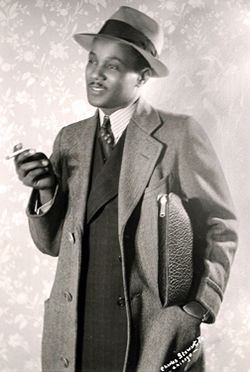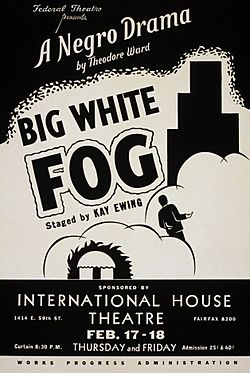Theodore Ward facts for kids
Quick facts for kids
Theodore Ward
|
|
|---|---|
 |
|
| Born | James Theodore Ward September 15, 1902 Thibodaux, Louisiana |
| Died | May 8, 1983 (aged 80) Chicago, Illinois |
| Occupation | Playwright, theatre educator |
| Education |
|
| Notable works |
|
| Notable awards |
|
| Spouse | Mary Sangigian (m. 1940) |
James Theodore Ward (born September 15, 1902 – died May 8, 1983) was an American playwright and theatre teacher. He wrote plays that explored important social issues. Ward was a key figure in the early Chicago Renaissance, a time when Black artists in Chicago created many amazing works.
People often called Ward the "dean of black dramatists." He was known for writing about the challenges faced by African Americans in cities during the Great Depression. His plays were praised for showing the Black experience in a new, realistic way. Unlike other plays of his time, Ward's works focused on natural stories and characters, rather than just songs and dances.
Theodore Ward wrote more than thirty plays. He also helped start the Negro Playwrights Company with famous writers like Langston Hughes and Richard Wright. His most famous plays are Big White Fog (1938) and the musical Our Lan' (1947), which was shown on Broadway in New York City.
Contents
Life Story of Theodore Ward
Early Years and Adventures
Theodore Ward was born in Thibodaux, Louisiana, as the sixth of eleven children. His father, Everett Ward, was born into slavery but became a schoolteacher after gaining freedom. He also worked as a salesman to support his large family.
Because his father was a teacher, Ward received a good education when he was young. He became interested in writing plays very early on. However, his father did not approve of his artistic dreams. Once, his father even burned one of Ward's early play scripts, calling it "the work of the devil."
When Ward was 12 years old, his mother passed away. After this, young Ward left home and traveled across the United States by freight train. He went north, finding odd jobs like shining shoes or working as a hotel bellboy. He eventually got into trouble with the law in Salt Lake City, Utah.
While in jail, Ward rediscovered his love for writing. He wrote many poems, short stories, and essays. These writings helped him get into a special program at the University of Utah in 1930. His professor, Louis Zucker, encouraged him to apply for a writing scholarship at the University of Wisconsin. Ward won the scholarship and studied literature and drama there. He also worked as a writer and voice actor for a radio station. Even though he was offered a chance to stay and get a degree, Ward decided to leave. He felt too isolated as a Black man in an all-white school.
Working with the Federal Theatre Project

After leaving the University of Wisconsin in 1933, Ward moved to Chicago. He found a job as a recreation director at the Abraham Lincoln Centre. His first role was teaching speech and drama to young people. Later, he joined the Negro Unit of Chicago's Federal Theatre Project (FTP).
The FTP was a program started during the Great Depression as part of the New Deal. Its main goal was to create jobs for artists, writers, and directors who were out of work. It also aimed to entertain families and create art that reflected American society.
Ward first worked as an actor with the FTP. He then started writing a short play in 1934. This play was inspired by a talk he heard about how African Americans were prevented from voting in the South. After making many changes, Ward entered his one-act play, Sick 'n Tiahd (1937), in a theatre contest. It won second prize.
His short play impressed Richard Wright, another writer, who encouraged Ward to keep writing for the theatre. Wright even introduced him to the South Side Writers Club, a group of Black writers. With their support, Ward finished his first full-length play, Big White Fog. It was produced by the FTP in 1938 and was very popular in Chicago.
Starting the Negro Playwrights Company
The success of Big White Fog in Chicago made Ward want to achieve more in New York City. He moved there in 1939, working as an actor in a play. He lived with Richard Wright in Harlem, who was writing for a newspaper.
Suddenly, the government decided to shut down the Federal Theatre Project. Ward found himself without a job. He was determined to continue his theatre work. With Wright's encouragement, Ward began looking for money and a theatre in New York to bring back Big White Fog.
After raising money and making new friends in the New York art scene, the play reopened Off-Broadway in 1940. It was the first play produced by Ward's new group, the Negro Playwrights Company. This theatre group was part of the growing Harlem Renaissance culture. Famous artists like Paul Robeson and Langston Hughes were part of it.
Critics and other writers praised Big White Fog for its serious and politically relevant story. However, the general public did not like its strong political message. As a result, the play closed after only sixty-four performances, and the Negro Playwrights Company also ended.
Despite this, Ward had some success in New York. On June 15, 1940, he married Mary Sangigian. She was an Armenian-American artist and social activist who worked for social justice. Like Ward, she worked hard for important causes. They had two daughters, Elise Virginia and Laura Louise.
Return to Chicago and Later Life
After they married, Ward and his wife moved back to Chicago. He began working on his next big play, Our Lan', in 1941. However, World War II started, which delayed the play's first production. Ward had to take on different jobs to support his family, working in a factory and writing for a government office. He eventually returned to teaching and led writing classes for adults.
After the war, Ward was finally able to promote his play about the Reconstruction Era in the South. The script won him a special Theatre Guild Award in 1945. This helped the play open in New York in 1947. After a successful start, it moved to Broadway for 42 performances. Even though Our Lan' had a short run, its Broadway premiere made Ward one of the few Black writers to have a play produced on Broadway after the Harlem Renaissance.
Ward received many honors, including "Negro of the Year" in 1947. In 1949, he became the first Black playwright to receive a Guggenheim Fellowship. This award allowed him to write a play about the abolitionist John Brown. This play was later performed in Chicago in 1951.
Theodore Ward wrote over 30 plays, many essays, and several poetry books. Despite his large amount of work, he is not as well-known today. This is partly because there wasn't much public support for Black theatre at the time. Also, his serious style and political views were not always popular. Ward was even unfairly targeted during the Red Scare, a time when people were accused of having certain political beliefs.
Because of these challenges, Ward always struggled to make a living as a writer. He eventually faded from public view. However, he continued to live and work in Chicago. He taught drama classes for children in 1963 and helped start the South Side Center for the Performing Arts in 1967. In the 1970s, he worked as a playwright for the Free Southern Theater in New Orleans. In 1975, he was recognized as an "Outstanding Pioneer of Black Theatre." In 1982, he received an award for excellence in drama from the DuSable Museum. Ward passed away from a heart attack in Chicago on May 8, 1983.
Theodore Ward's Legacy
Since the 1940s, Ward's plays have not been performed very often. Shortly before he died, Big White Fog had a special reading in New York City. In 1995, the Penumbra Theatre Company produced the play in Minneapolis. A decade later, in 2007, Big White Fog was performed internationally for the first time in London.
After Ward's death, the Theater Center at Columbia College Chicago created The Theodore Ward Prize for African-American Playwrights. Since 1985, this competition has given a cash prize and a professional production to new Black playwrights. These playwrights write about the Black experience in America. In 2015, Ward was honored by being added to the Chicago Literary Hall of Fame.
Works
- Theatre
|
|
|
 | John T. Biggers |
 | Thomas Blackshear |
 | Mark Bradford |
 | Beverly Buchanan |

